Swedish start-up DSruptive Subdermals, which specialises in implantable microelectronics, has concluded a world-first study in the use of chip implants to track body temperature.

The study sought to measure the feasibility of subcutaneous implants for measuring body temperature in humans. Over a four-week period, healthy subjects received one or two implant temperature sensors which transmitted temperature readings to a smartphone app. At the end of the period, the participants were brought into a clinic where their implants were read and in parallel had their body temperature measured with standard clinical thermometers in order to compare the quality of the measurements in a controlled setting.
The results of the study found that the digital implants were able to measure temperature with non-inferior accuracy to standard clinical devices. The implants measured temperature with an intra-device variability similar to clinical thermometers. At the same time, the study concluded that implantation of the device is safe, induces little discomfort and is without adverse effects in the follow up period. This is the first time a study of this kind has been completed with the results indicating that injectable implants could be a robust, reliable, and affordable form of health logging for both personal use and in a clinical setting.
Based on the demonstrated viability of the implants as a platform for temperature measurement, DSruptive is now offering its implants as an open platform for researchers around the world who are looking for robust and cost-efficient tools to monitor temperature changes remotely. The aim of this platform is to enable research and development in the healthcare space which drives innovation and results in better tracking that improves health and saves lives.
The implant used in the study is a small, injectable cylindrical capsule made of biocompatible glass with an electronics inlay with an NFC antenna and temperature sensor. It is passive and cannot transmit any information independently. The implant is activated by swiping it with a smartphone which activates the implant device to make a temperature reading, which in turn is transferred to a smartphone app and a cloud data storage service.
Hannes Sjöblad, managing director of DSruptive, said: “It’s tremendously exciting to bring the results of this research to the world – the first time this kind of implants have been properly studied in a clinical environment. The results demonstrate the potential for passive subdermal implants to play an important role in the ongoing paradigm shift towards personalised health and remote monitoring in healthcare. We also want to contribute towards the ongoing fight against COVID-19 and any future pandemic outbreaks. Therefore, we will open our platform for researchers around the work who are interested in implants for remote monitoring of temperature fluctuations in humans. We see a number of potential use cases including timesaving for front line medical staff and an improved understanding of health over a longer period of time that we are keen to explore further.”
Daniel Andersson, head investigator, MD and associate professor in Physiology at Karolinska University Hospital added: “The data from this study is really promising and opens up the possibility of deploying temperature monitoring via digital implants in a wide range of physiological and clinical applications. For example, we are currently experiencing the worst medical emergency in a century. With digital implants, we could potentially track outbreaks of COVID-19 or other transmissible infectious diseases more rapidly – with huge benefits for our health, our economies and our societies.”
The study was undertaken in co-operation with researchers at Karolinska Institute and Karolinska University Hospital in Stockholm and approved by the Swedish Ethical Review Authority.






